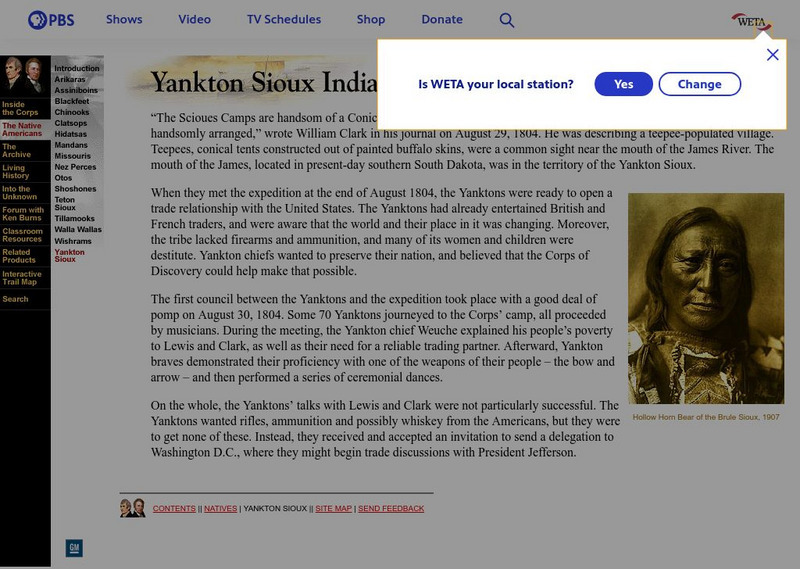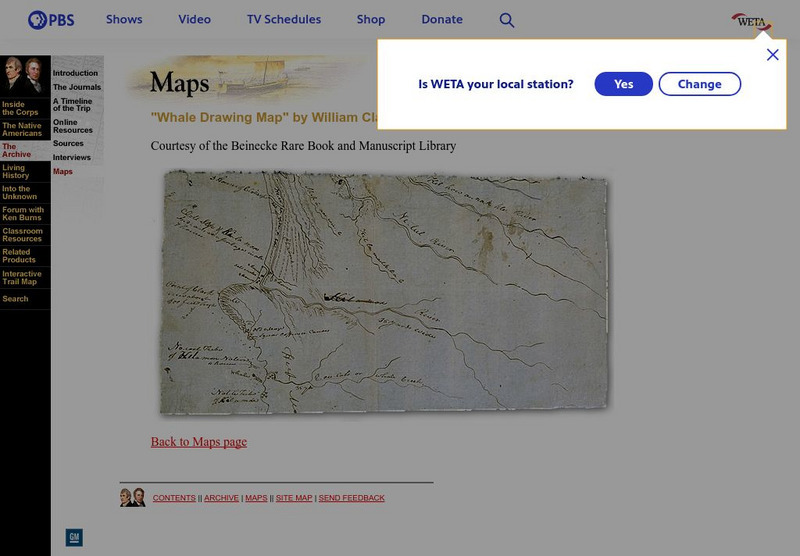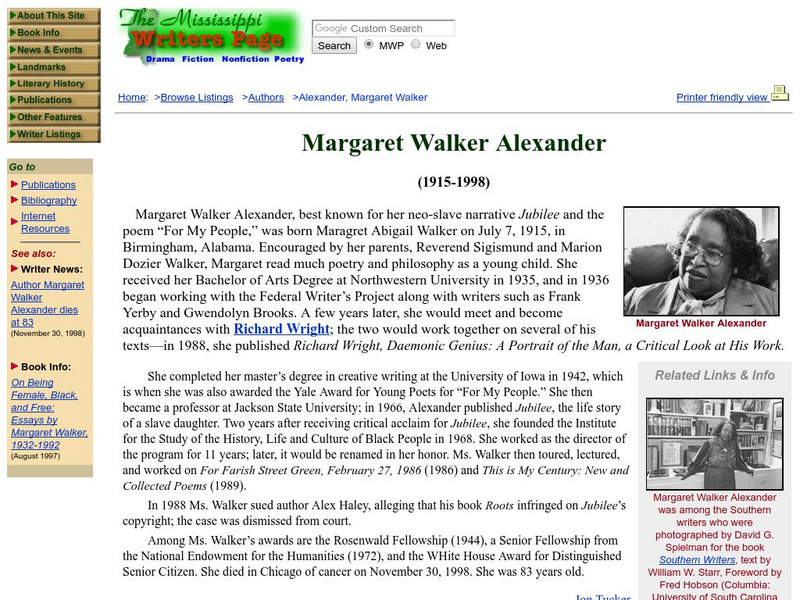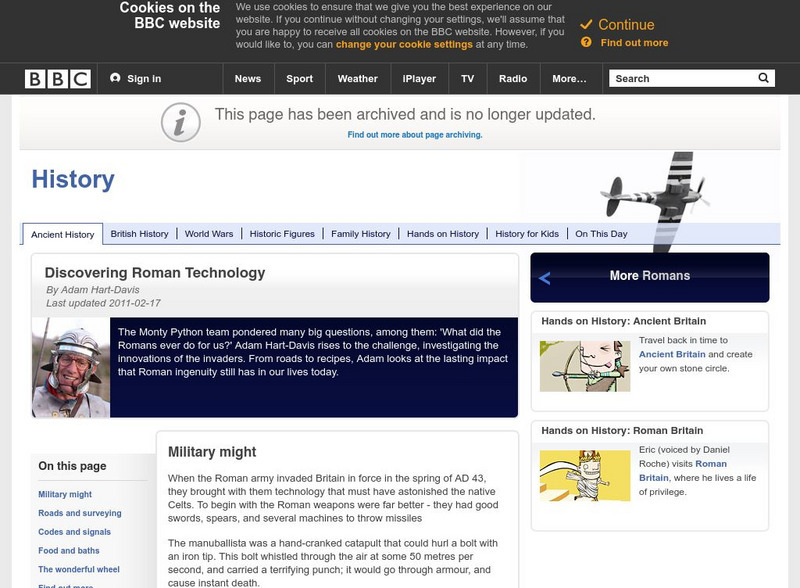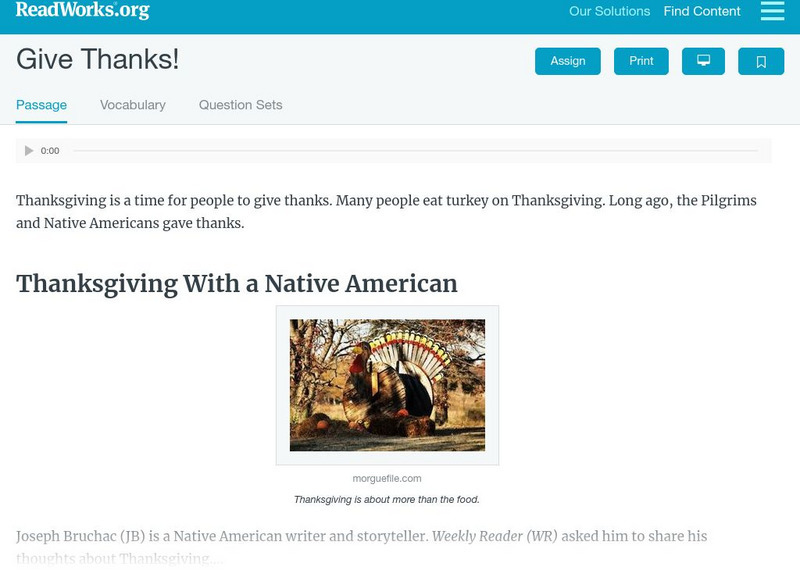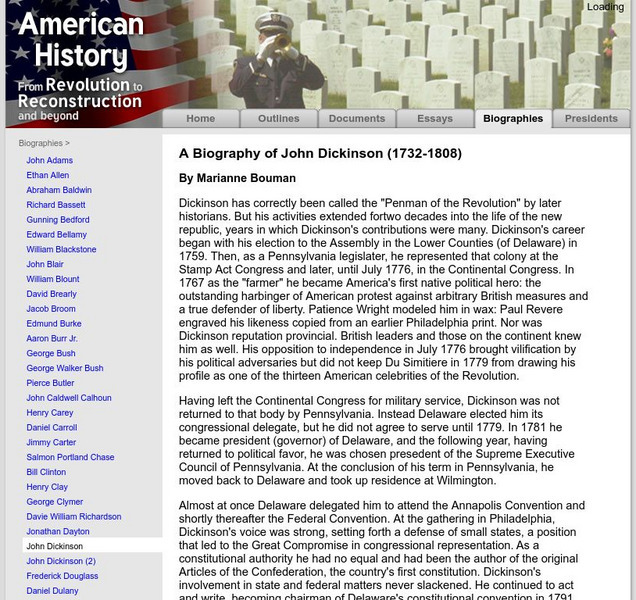PBS
Pbs: Lewis and Clark: Walla Walla Indians
What good hosts the Walla Walla Indians were to the Corps of Discovery. Read about the gifts exchanged and the celebrations held when Lewis, Clark, and their men stopped by for a visit. From PBS.
PBS
Pbs: Lewis and Clark: Wishram Indians
A look at a little-known tribe, the Wishram Indians, encountered by the Corps of Discovery on their return trip up the Columbia River. Read about the importance of trade networks to the Indians. From PBS.
PBS
Pbs: Lewis and Clark: Yankton Sioux Indians
Read about what the Yankton Sioux wanted from Lewis and Clark and why they were disappointed when they met the Corps of Discovery on its journey up the Missouri River. From PBS.
PBS
Pbs: Shoshone Indians
PBS Provides an article on the Shoshone Indians and the Lewis and Clark expedition.
Other
Powersource: Cherokee Stories
This site from Powersource gives links to many Cherokee myths, including the "Cycle of the Seasons" and "Rock House: Why the Sun Follows the Moon." These are both good examples of the Cherokee religious beliefs of creation.
PBS
Pbs: Lewis and Clark: "Whale Drawing Map" by William Clark
See this map drawn by William Clark of where the men from the Corps of Discovery found the whale which the Tillamook Indians told them about. From PBS.
Other
The Weekly South Dakotan: South Dakota History for 4th Grade
From the very beginning and through the twentieth century, this comprehensive collection of lessons will enrich students studying the history in between and the effects on South Dakota.
Other
Kitikmeot Heritage Society: Angulalik Fur Trade: Stephen Angulalik
This website profiles a fur trader in the 20th Century, over a century after the merger of the North West and Hudson's Bay Companies in 1821. But this website is interesting for assessing the impact of the fur trade on First Nations...
National Geographic
National Geographic: Exploring the Chesapeake: Then and Now
Resource provides an interactive map that takes you to places on the Chesapeake Bay that John Smith explored and you find out the historical events that occurred. Pictures and drawings of time accompany the explanations.
National Women’s History Museum
National Women's History Museum: Pocahontas
Students will learn about Pocahontas' life and explore the relationship between legend and history when it comes to the infamous incident in which John Smith claimed she saved him.
iCivics
I Civics: Elk v. Wilkins (1884)
This mini-instructional activity examines the Supreme Court's ruling that the 14th Amendment's Citizenship Clause did not apply to American Indians born on Native reservations. Students analyze a primary document and discover how the...
Digital History
Digital History: Indian Removal
The Indian Removal policy was inhumane and without empathy for the Native Americans who were forced from their lands. Read about the attempts to enforce federal treaties and the final removal of three major tribes from the Southeast.
Other
Penobscot Indian Fact Sheet
A site filled with information about the Penobscot Indians past and present. There are numerous hyperlinks to pictures, legends, language, and many other sources for information. This is a personal site written by a Cherokee Indian...
Other
Mississippi Writers Page: Margaret Walker Alexander
The University of Mississippi lauds its native Margaret Walker Alexander. Included are biographical information, an extensive bibliography of her works and those written about her, and a link to the Margaret Walker Alexander National...
Oklahoma State University
Chronicles of Oklahoma: History of the Kiowa Comanche Reservation
A lengthy article examining the historical background of the use of Oklahoma as a place for Native American reservations. The idea started with Jefferson and led to the eventual relocation of the Kiowa tribe.
Microsoft
Microsoft: The Story of Sacagawea's Son Pomp
Lewis and Clark traveled for two years and covered 4,000 miles to reach the Pacific Ocean. They had the help of a young Native American girl, Sacagawea, who carried with her a small baby! Students will learn about the Lewis and Clark...
World Atlas
World Atlas: Australia/oceania
Features a description of Oceania that although the smallest continent includes Australia, New Zealand, Papua New Guinea, and Micronesia. Click on any tab about the map to learn much information about its geography, symbols, natives, and...
BBC
Bbc History: Ancient History: Romans: Discovering Roman Technology
Article examines the technology the Romans brought with them when they invaded Britain in AD 43. From their missile-throwing machines to surveying materials and signaling flags, it's easy to see how the Romans quickly overtook the native...
Independence Hall Association
U.s. History: Middle Colonies: Quakers in Pennsylvania and New Jersey
A good look at the philosophy of the Quakers who colonized William Penn's religious refuge in the colony of Pennsylvania. Read about Penn's liberal views about government, religious freedom, and relations with Native Americans.
CommonLit
Common Lit: Chief Powhatan's Address to Captain John Smith (1609)
The Powhatan are Native American people from Virginia who share an Algonquian language. In 1607, the Jamestown settlement in the Virginia colony became the first permanent English settlement in the Americas. At the initial arrival of the...
Read Works
Read Works: Give Thanks
[Free Registration/Login Required] Students read about Thanksgiving traditions in a Native American family. A question sheet is available to help students build skills in author's purpose.
University of Groningen
American History: Biographies: John Dickinson (1732 1808)
Dickinson has correctly been called the "Penman of the Revolution" by later historians. But his activities extended fortwo decades into the life of the new republic, years in which Dickinson's contributions were many. Dickinson's career...
Alabama Humanities Foundation
Encyclopedia of Alabama: Sports and Recreation: Willie Mays
Illustrated biographical profile of Alabama native Willie Mays, baseball Hall of Famer.
Alabama Learning Exchange
Alex: Tad the Tadpole
Tad the Tadpole is designed to demonstrate how pollution in various areas affects wildlife in their native habitats. The lesson is designed to stress the importance of conservation for animals and their surrounding environment. Upon...




